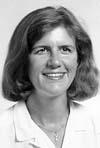 Janice
Key, M.D., assistant professor in the Department of Pediatrics,
sees a painful trend in adolescent health.
Janice
Key, M.D., assistant professor in the Department of Pediatrics,
sees a painful trend in adolescent health. Basic health care a trend at Burke
High
by Frank Mortimer,
Public Relations
 Janice
Key, M.D., assistant professor in the Department of Pediatrics,
sees a painful trend in adolescent health.
Janice
Key, M.D., assistant professor in the Department of Pediatrics,
sees a painful trend in adolescent health.
„In the past 50 years, every population group in the United States has decreased its mortality rate...except adolescents,š she said.
Recognizing the national trend and local needs, MUSC has strengthened its commitment to the health and well-being of adolescents on the Charleston peninsula.
The student health clinic at Burke High School, opened three years ago by the College of Nursing and Department of Pediatrics, recently became one of a dozen community outreach programs to be funded in MUSC‚s Healthy South Carolina Initiative.
Located a few blocks from the MUSC campus, Burke is an inner-city school which serves approximately 1,000 students, 99 percent of whom are African American.
„The idea is to take preventive basic health care to the students,š said Key, a founder of the Burke school clinic, the first comprehensive school-based clinic in the state. „The school came and asked for MUSC‚s help. It wasn‚t just us deciding what they needed.š
Key said the facility now will expand its educational services to students and parents, while offering new clinical learning opportunities for MUSC students. In addition, the staff will conduct a cost-effectiveness study aimed at encouraging more school-based sites in the Charleston area. In the absence of accessible primary care, patients tend to rely on emergency rooms for primary care.
Although Charleston has premier medical facilities, Key said, it‚s clear that adolescents encounter barriers to using health services. These barriers include poor insurance coverage, inaccessible location and lack of confidentiality.
The clinic provides a source of health care that is accessible and prevention-oriented. Medical services include physical examinations, sports pre-participation physicals, and treatment for minor illnesses and injuries. A support program for adolescent parents, the Second Chance Club, and a new program to increase minority nursing and medical students, „3000 by 2000,š are located at Burke.
Key and Walter J. Jones, Ph.D., a professor in the Department of Health Administration and Policy, gained strong administrative support for the proposal to expand the clinic‚s activities.
„Your focus on adolescent health and the effectiveness of a school-based, clinical-educational program is praiseworthy,š wrote John Johnson, Ph.D., dean of the College of Health Professions. Johnson said the clinic‚s role in health and education is „especially critical in light of the recent increase in illness and mortality rates among this age group.š
Key said the causes of illness for adolescents have changed dramatically in recent decades, from infectious diseases to what has been termed „the new morbidity.š Now the three leading causes of death for adolescents are motor vehicle collisions, homicide and suicide.
„Pregnancy, substance use and abuse, school failure, and mental health issues remain too common,š she said. A 1995 study by the S.C. Department of Education found a high rate of risk-taking behaviors such as drinking, smoking, sexual activity, carrying of weapons, inadequate exercise and poor diet. South Carolina remains one of the highest in the nation for teen pregnancy and infant mortality.
Thelma Aiken, a social worker and coordinator of the Second Chance Club, said the main objective is to encourage the young mothers to come back to school to complete their high school education. „We encourage them to read, and to read to their babies,š she said.
The clinic staff will provide both individual patient education and group education through the adolescent mothers group, classroom education for students, health education for school faculty, and outreach health education for parents and the community surrounding Burke.
Already a training site for residents and nursing and medical students, the clinic will offer opportunities to dental students, pharmacy students, physician assistant students and others attending all six colleges at MUSC.
The health profession students, in turn, serve as role models for Burke High School students and may foster their interest in pursuing careers in the health profession.
„I‚ve seen a lot of good things happen here,š said Peggy Jenkins, the clinic‚s administrative specialist. „I‚ve seen a lot of children turned around not only physically but academically. We don‚t just treat the physical person. We treat the whole person.š